By our Swiss Correspondent and contributing writer Frank Götz © 2024
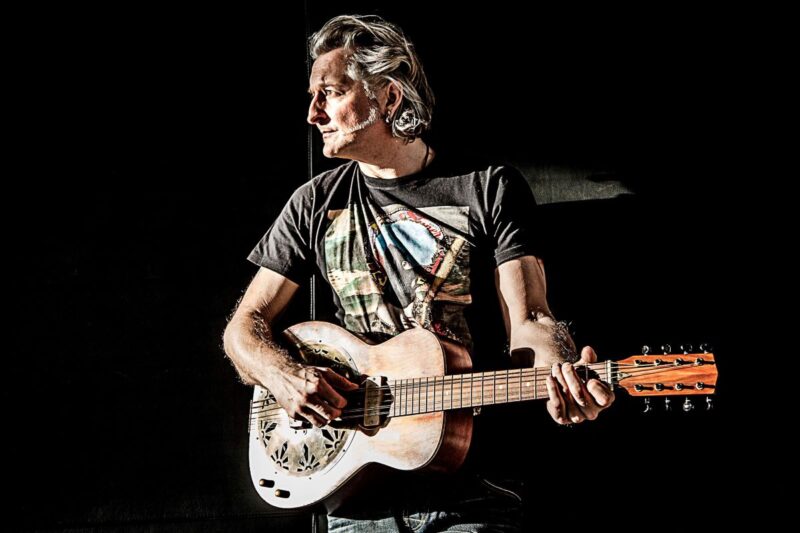
Europe has always been a hotbed for the blues. Ever since the 1960’s, when young mavericks like Eric Clapton, Peter Green, Rory Gallagher, and Keith Richards played a major role in the global dissemination of the blues, Europe has become a second home to the idiom. From England and Ireland, the news spread to the continent. Nowadays you’ll find devoted artists and world-class performers everywhere, not to mention beloved expats like Eric Bibb and Brian Kramer, who’s tireless efforts in keeping the genre alive outside of the U.S. cannot be overstated. As far as blues culture goes, Europe seems to have it all – appreciative crowds, great venues & festivals, and some of the best blues artists you’ve possibly never heard of.
Oliver Mally is one of them. Born in Austria in 1966, he’s barely known abroad, yet after countless albums and blues awards and decades on the road, the singer-songwriter from Wagna, Styria is so accomplished that he deserves a wider recognition. He started out playing electric blues, but since the late nineties, his acoustic gigs have become more prolific, often performing alone or with congenial partners, and today full band shows are the exception. Clearly, he’s an acoustic bluesman, although Mally would never call himself that. “I’m a blues fan, not a bluesman!”, he insists, keenly aware of the genre’s African American heritage. He averages about 130 shows a year, and has worked with the likes of Louisiana Red, Champion Jack Dupree, Steve James, Doug MacLeod, Ian Siegal, and Rob Rio, to name a few of the better-known acts.
He’s usually billed as “Sir” Oliver Mally, and the origin of his moniker is part of his stage persona. According to his own narrative, he gave the title to himself. That was in 1991, after the organizer of a blues festival in Budapest asked for his stage name. Well, he didn’t have one just then. Mally would’ve liked to call himself “King”, but with a name like that, he figured, there would’ve been no room for advancement, especially as a blues artist. So, he settled for “Sir” and the label stuck – “like a bad tattoo”, he jokes. Yet, being a predominantly acoustic player is only one of the reasons he’s featured here. Mally is also a local concert and festival organizer, so when he’s not on stage or in a recording studio, he’s busy putting together events like the Leibnitzer Bluestage, the Grazer Bluestage, or the Blue Bird’s Friday-series, along with his own gigs and tours.
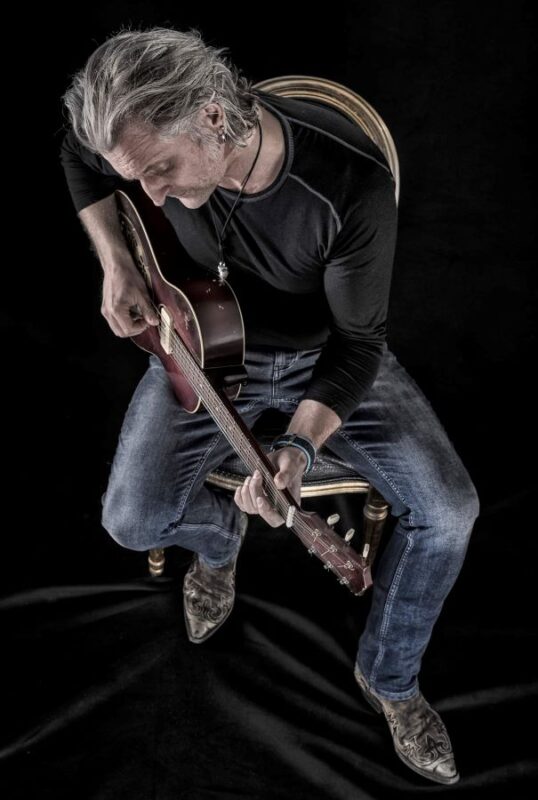
Clearly, the man has earned his moniker, so if you’re looking for a true example of European blues royalty, this is your guy. He’s gracious and witty and culturally well-informed. And, as an interview partner, he has an obvious knack for print-ready statements.
thecountryblues had the pleasure of talking with “Sir” Oliver via Zoom on December 12th, 2023. The following interview was originally held in German, so the translation offered here is for your reading convenience.
Tell us how it all started, about your beginnings as a blues musician.
Like many of my generation, I started out with an electric guitar. I loved musicians like Johnny Winter and indulged in endless guitar orgies. One day, however, I discovered an LP by Townes Van Zandt and began to pay attention to the lyrics of Stones songs. That’s when I discovered a fourth chord. I realized that I couldn’t go on forever with a band, that at some point I had to learn how to play as a solo artist. There are places you can only conquer alone. Then I started playing in a small fish store for three hours every Sunday. For months, just me and the audience, playing only for tips & change. That was in Austria, when I was already relatively well known. I wanted to find out what it was like to play solo. You can’t hide or pass the ball to someone else; you’re alone up there, no matter how many people are listening to you. It’s a different world, all of its own. Even today, I look around carefully before every performance and try to find out: What does this room need? How can I reach this audience emotionally and intellectually with my introductions and songs in such an intimate setting? For me, this is the be-all and end-all of a successful concert.
Ben Harper once said, “the blues chooses you as much as you choose it.” When and where exactly did the blues find you?
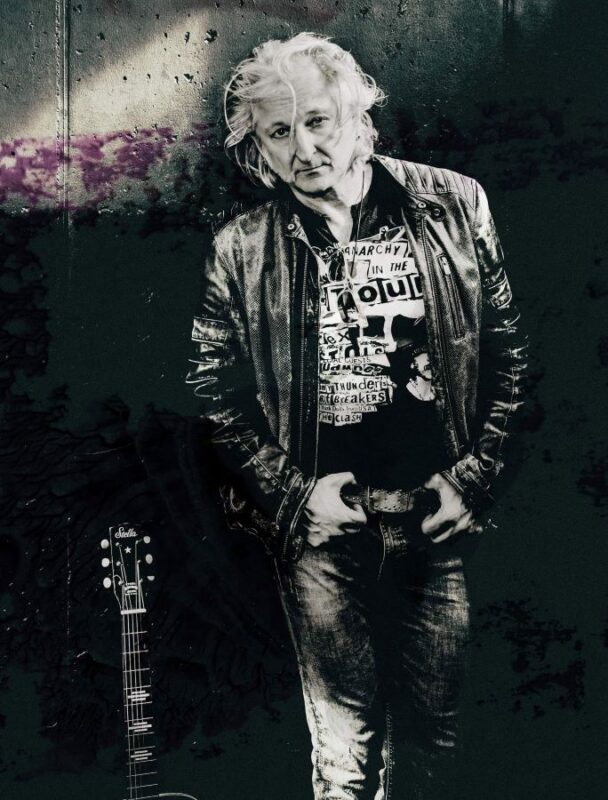
When I was a teenager, at a colleague’s house. He lent me the Hard Again album by Muddy Waters, the record with the song “Mannish Boy” [Blue Sky Records, 1977]. That was an earthquake from which I never recovered. That passion, that power – from then on, I knew what I wanted to do. Even today, that song still blows me away. That’s the madness in this kind of music: the eternal second chance for a first time. That record was my initiation, and many have followed since. John Lee Hooker, of course, and Lightnin’ Hopkins, their music was a revelation, too. In terms of storytelling, simplicity, and suspense, these three musicians are still my heroes.
What’s the best advice you’ve ever received from a blues musician? What advice would you give to an inexperienced young artist today?
What Doug MacLeod once told me: “Never play a note you don’t believe in!” It’s not about me. It’s not about you, or the press, or some show you put on to impress people. If you want to make good music, really good music, then it’s about the song and what it needs to unfold its magic. The stage is no place for ego trips. You need to make yourself small so that your song material can become big. “Serve the song!”, as they say in English, everything else is secondary.
But there are other influences in your music.
True. I’m just a big music fan, I guess. I don’t like it when music is regimented and packaged in different little boxes. That makes no sense to me. I don’t want to play or listen to only pre-war blues, or jump blues, or boogie, because I like so many different things. I grew up in a musical household where there was always something on: Ray Charles, Ike & Tina Turner, Fats Domino, Randy Newman – that was the stuff that was playing in my dad’s car. And my mother loved Elvis and Little Richard. Also, we often went to the movies, visited museums and art exhibitions, and my parents always provided me with literature and good books. Culture was a big thing in our house, a gift for which I’m still grateful today. In terms of music, other important figures came along, figures like Bob Dylan, Johnny Cash, Steve Earle and the unfortunately little-known Steve White. I love country music, I love folk, I love everything that is called Americana today. And if I could play jazz or classical music, I’d do that, too – as long as it’s done with the necessary respect.
What shaped you as a guitarist? Where did you get your instrumental chops?
I got my first guitar when I was 15. Here, too, it was that Muddy Waters album I tried to play and emulate. What a crazy sound, that electric guitar – just mesmerizing. Acoustically, Johnny Winter impressed me most. The sounds he got out of his National Steel on those early records were just mind-blowing. Ry Cooder came later. In five minutes, he says everything you can possibly say with a bottleneck, without ever overplaying. He simply set the standard. In rock music, it was definitely a Stones record, probably one of those cheap compilations you could buy in any village store back then. For me, Keith [Richards] was the beacon for hard, catchy riffs and crashing power chords, I didn’t know anything harder back then.
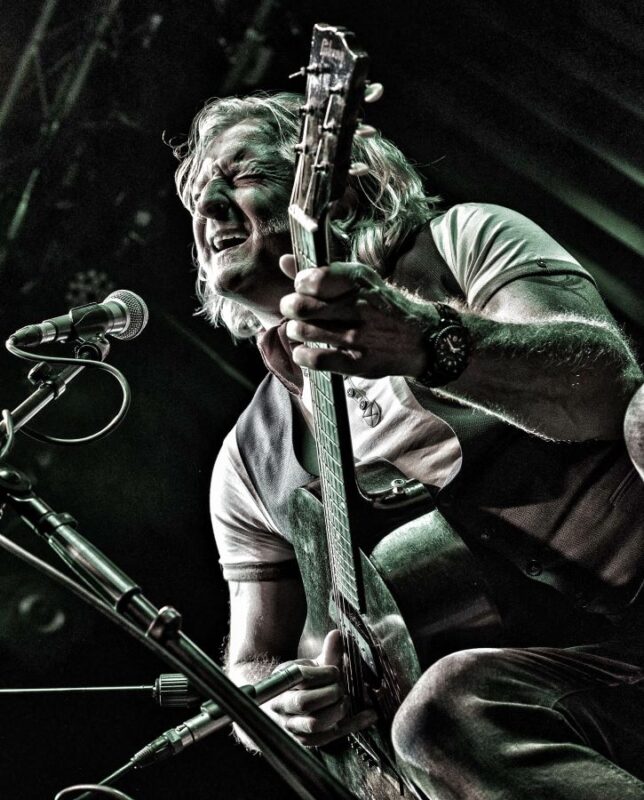
However, what completely blew me away was No Friend Around, a [John Lee] Hooker LP from 1969 – boom! He just stomps and plays and sings as if there were three guys in the room. He still makes my hair stand on end.
Again, stylistically very different things, not just blues music.
Absolutely. Just playing blues would be too much for me – and not enough at the same time.
You have several band projects and perform with friends, mostly virtuoso accompanying musicians. What are the highlights of your almost 40-year career?
At first, I was a street musician and studied at university on the side. Then, at around 25, I became a professional musician. There were many highlights so far, more than I can talk about here, but at least the duo and trio performances should be mentioned. Because no matter whether I’m up there with Hubert Hofherr [harmonica], Martin Moro [guitar], Martin Gasselsberger [piano] or Peter Schneider [guitar], the shows with them are always intense. Your readers probably won’t know any of these guys, but they’re good – really, really good. I’ve also performed with more internationally known people such as Doug MacLeod, Ripoff Raskolnikov, Roberto Luti, or Ian Siegal, with whom I recently did a small club tour. A great guy, both on stage and off. He has played on several of my records, and next year we want to do a whole album together. Other highlights include gigs with recognized blues greats such as Louisiana Red, Steve James, and Sugar Blue. Gigs like those stay with you for a lifetime because, man, they’re so rewarding and instructive.
I read that your next album will be with Peter Schneider.
Yeah, it’s called Almost There and will be released on April 20, 2024. Peter is a great musician; we’ve been playing together for years. He worked with Ike Turner and Marius Müller-Westernhagen for a long time, and he’s one of the most open-minded people I know. A real thoroughbred musician – when you play with him, he’s always right there. He plays with a lot of variety and doesn’t like to repeat himself, which keeps the interplay organic. Virtuoso is a total understatement! With him, the creative process and exchange between guitar and vocals is always stimulating. We complement each other perfectly, both in our strengths and differences.
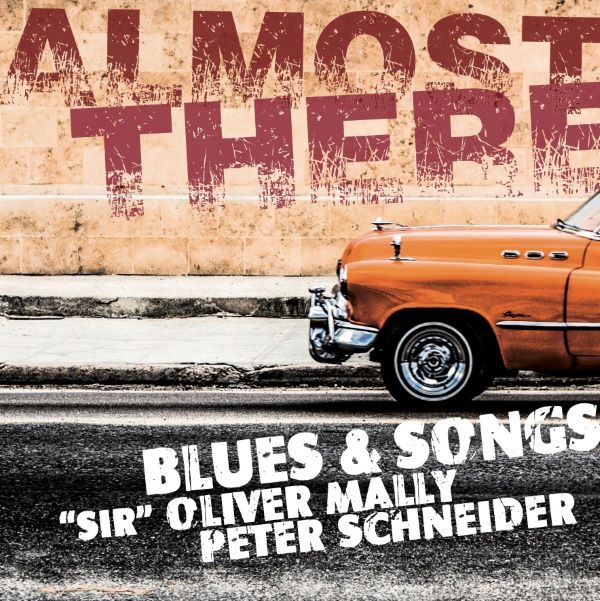
OK, last question. If you could have a jam session with three musicians who have never been on stage with you before, who would you invite? Just three!
Ry Cooder. Never seen him live but I wouldn’t mind travelling a long, long way to see him. Or Steve Earle. I’d love to meet him someday or open a show for him. There are so many good musicians I could mention, but some of my favorites are already dead. Bonnie Raitt, perhaps, because she can sing and play slide guitar so well. I always really liked her.
Two days later, I was lucky enough to see “Sir” Oliver live in a sold-out country pub. He played with Martin Gasselsberger, his first-class piano sidekick, and with their jazzy mix of folk, country and purely acoustic blues tunes, they drove each other to new heights over and over again. Just stunning. Now this writer, too, can testify that the man with the washed-out jeans and the bright red bandana is a poet, a rebel, and an eloquent entertainer to boot. Mally has been one of Europe’s top blues artists for a while now – and that, in itself, is quite an achievement.
His homepage: